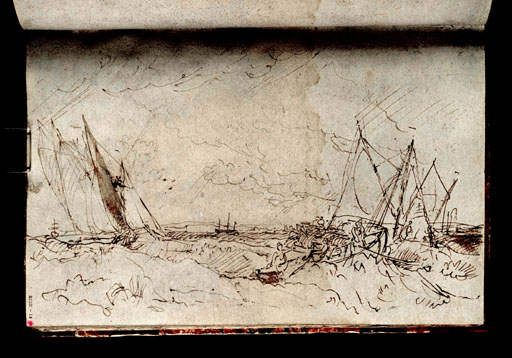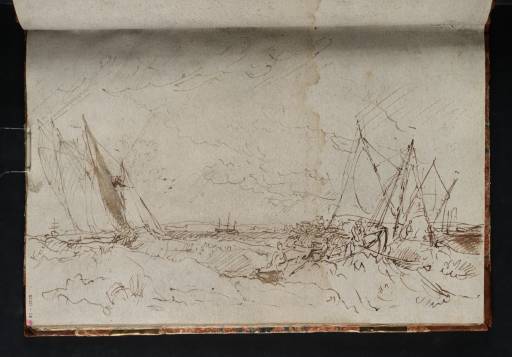Joseph Mallord William Turner Study for 'Sheerness and the Isle of Sheppey, with the Junction of the Thames and the Medway from the Nore' c.1805-7
Image 1 of 2
-
 Joseph Mallord William Turner, Study for 'Sheerness and the Isle of Sheppey, with the Junction of the Thames and the Medway from the Nore' c.1805-7
Joseph Mallord William Turner, Study for 'Sheerness and the Isle of Sheppey, with the Junction of the Thames and the Medway from the Nore' c.1805-7 -
 Joseph Mallord William Turner, Study for 'Sheerness and the Isle of Sheppey, with the Junction of the Thames and the Medway from the Nore' c.1805-7 (Enhanced image)Enhanced image
Joseph Mallord William Turner, Study for 'Sheerness and the Isle of Sheppey, with the Junction of the Thames and the Medway from the Nore' c.1805-7 (Enhanced image)Enhanced image
Joseph Mallord William Turner,
Study for 'Sheerness and the Isle of Sheppey, with the Junction of the Thames and the Medway from the Nore'
c.1805-7
Joseph Mallord William Turner 1775–1851
Folio 16 Recto:
Study for ‘Sheerness and the Isle of Sheppey, with the Junction of the Thames and the Medway from the Nore’ circa 1805–7
D05791
Turner Bequest XCIII 16
Turner Bequest XCIII 16
Pen and ink and brown wash on white wove paper, prepared with a grey wash, 171 x 262 mm
Inscribed by John Ruskin in red ink ‘16’ bottom left, descending vertically
Stamped in black ‘XCIII 16’ bottom left, descending vertically
Inscribed by John Ruskin in red ink ‘16’ bottom left, descending vertically
Stamped in black ‘XCIII 16’ bottom left, descending vertically
Accepted by the nation as part of the Turner Bequest 1856
References
1909
A.J. Finberg, A Complete Inventory of the Drawings of the Turner Bequest, London 1909, vol.I, p.243, XCIII 16.
1975
David Blayney Brown, ‘Turner, Callcott and Thomas Lister Parker: New Light on Turner’s “Junction of the Thames and Medway” in Washington’, The Burlington Magazine, vol.117, November 1975, p.721.
1982
Evelyn Joll and Martin Butlin, L’opera completa di Turner 1793–1829, Milan 1982, p.86.
1984
Martin Butlin and Evelyn Joll, The Paintings of J.M.W. Turner, revised ed., New Haven and London 1984, p.49.
1993
David Hill, Turner on the Thames: River Journeys in the Year 1805, New Haven and London 1993, p.165.
Hill observes that this lively drawing ‘gives the impression of having been made in haste and perhaps from a boat’, and certainly Turner took the sketchbook on a trip down the Thames. However, although it contrasts with the studio watercolour study on pseudo folio 11 ( [originally 41], D05838), which may have been partly based on it, it seems to the present writer too poised and studied to be made in this way, and much less rapid and spontaneous than other sketches of shipping on folios 17 verso–18 verso (D05793–D05795). The composition is quite complex, typical of Turner’s Estuary marines, and moreover as Hill observes, ‘the correspondence is very close’ to Sheerness and the Isle of Sheppey, with the Junction of the Thames and the Medway from the Nore exhibited at Turner’s Gallery in 1807 (National Gallery of Art, Washington DC).1
A double-spread drawing in the Calais Pier sketchbook (Tate D04992–D04993; Turner Bequest LXXXI 90–1) possibly related to the same picture has an inscription ‘Do’ (Ditto) that seems intended to repeat another, ‘Study not painted 1805’ (D04994–D04995; Turner Bequest 94–5). If these connections are accepted they would imply that the picture was planned that year and is contemporary with the first use of the present sketchbook. Andrew Kennedy has recently associated a group of Turner’s Sheerness pictures including the Washington Junction of the Thames and the Medway with Turner’s trip at the turn of 1805–6 to see the Victory when she returned from the Battle of Trafalgar.2 However, Turner must often have travelled down-river. (See Sketchbooks and Drawings of Marine and Naval Subjects: the ‘Victory’, the Battle of Trafalgar, Captured Danish Ships and a Review at Portsmouth circa 1803–14).
Verso:
Blank
David Blayney Brown
October 2007
How to cite
David Blayney Brown, ‘Study for ‘Sheerness and the Isle of Sheppey, with the Junction of the Thames and the Medway from the Nore’ c.1805–7 by Joseph Mallord William Turner’, catalogue entry, October 2007, in David Blayney Brown (ed.), J.M.W. Turner: Sketchbooks, Drawings and Watercolours, Tate Research Publication, December 2012, https://www

